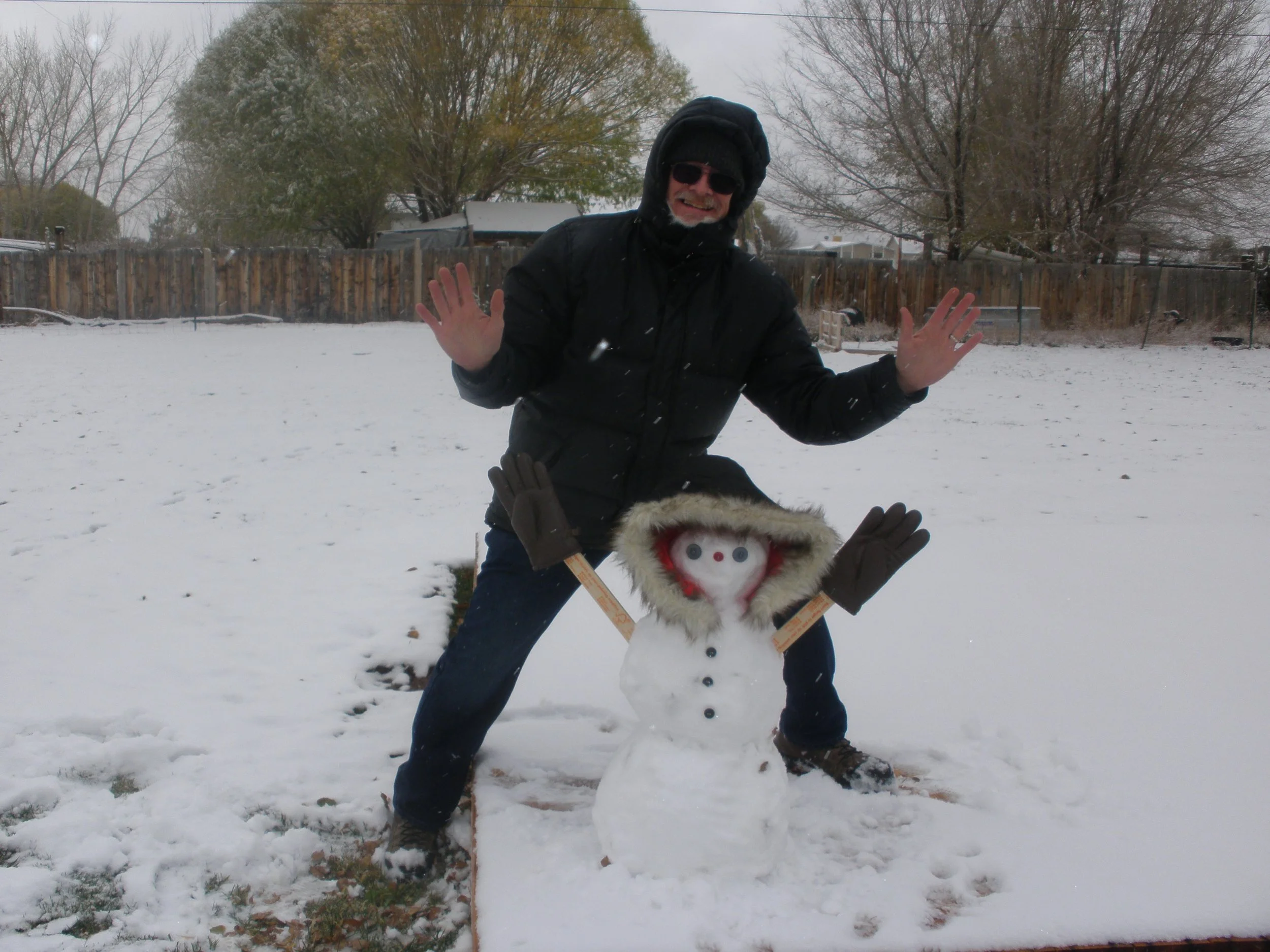"Things I Have Learned in My Lifetime" by George Albert Fruhling
With the recent passing of my father, George Albert Fruhling, earlier this month (obituary), I wanted to begin sharing some of the many things I learned from my dad over the years. For many years, while we had our respective corporate desk jobs, he at Ball Corporation and I at Cengage Learning, my dad and I would exchange regular emails during our work days—from innumerable jokes, poems, letters, to random pieces of advice and inspirational memes. One of the more memorable emails I received from my dad contained the following list of 101 “Things I Have Learned in My Lifetime.”
There is a rich tradition of writing and passing down useful and practical maxims (e.g., Poor Richard’s Almanack by Benjamin Franklin, Seneca’s Letters from a Stoic, etc.) for the benefit of others and for future generations. Sadly, too often such maxims are taken to heart only later in one’s life after having learned the lessons the hard way. But my dad thought to share them with me and my sister, and presumably with others, in the hope of handing down some of his own hard-earned wisdom, and perhaps something of himself in the process.
As a philosopher, within my dad’s maxims for living I see shades of stoicism with its emphasis on self-control and the limiting of desires, Aristotelian virtue ethics and Epicureanism with their shared emphasis on moderation (i.e., the “Golden Mean,” as Aristotle called it—in fact, Aristotle’s Nicomachean Ethics is commonly held to be named for either his father or his son, both of whom were named “Nicomachus,” a testament to the natural and universal human desire to impart intergenerational wisdom, in any time period), Kantian rule-based ethics, Christian piety, and existential positivity and accountability.
Regardless of the historical parallels and philosophical influences in the following list, many people who knew my dad have told me that he was one of the most practically-wise people they have ever known, which I believe the following list illustrates and bears out. And it is my honor to be able to share some of my dad’s immensely practical wisdom with the world at large.
“Things I Have Learned in My Lifetime” by George Albert Fruhling
I consider myself just an ordinary man. I have made mistakes in my life, but I also have tried to learn from my mistakes and not duplicate any of them. I truly want to continually better myself, be well liked, and be known and remembered as a good person. Here are a few things I have learned throughout my lifetime, and yes, some of them I learned the hard way, but still, things I have learned, I now try to live by.
It seems life is broken down into does and do-nots. It also seems to me that the do-nots are created because we as humans sometimes do not get the does correct and require some guidelines. Anyway, however your viewpoint, rules, laws, and guidelines are good to live by throughout life.
Some of the following I have learned from others, but a lot on my own. I have tried to express all of these in my own words. After creating my list, I feel as though I should have been able to, and actually should have, made up a list like this at half the age I am now. If I had, I am convinced that my life now would be even more enjoyable and fruitful than it is. By my sharing my list with others, I truly hope it will help someone to want to create their own list for what works for them in their life so they can have it better down their own road of life.
Never jeopardize right for the sake of wrong.
Do not make trouble where there is none.
Do not gossip. Do not listen to what others are saying that is not your business. Do not pass along to others what is not your and/or their business.
Do not be jealous. Jealousy will only eat at your heart, mind, and soul. There is no healing or happiness in jealousy. With jealousy you will only make bad decisions that you will regret later.
Keep your nose out of where it doesn’t belong.
Do not point fingers. There is a better and happier ending if you look at your own self. Try to see yourself as others see you.
Do not play games with people’s emotions.
Do not make other’s troubles your troubles. Do not make your troubles someone else’s troubles.
Do not do or say anything that will hurt anyone, or that you will regret later.
Do not let yourself get addicted to anything bad, harmful, unlawful, immoral, or nasty (abuse, alcohol, drugs, overeating, sex, lying, laziness, too much TV, violent video games, etc.). If you are addicted, show some grit and get off your addiction. Same with habits.
Unload you own baggage for it will only weigh and slow you down. Having baggage will hurt those who love you, and keep you from having better relationships. Get rid of your troubles. Do not give your troubles to others.
Don’t be selfish. Tend to your family’s and your own needs before your own wants.
Do not worry about things over which you have no control.
Do not procrastinate. Do not put off until tomorrow what you can still can do today that you should have done yesterday. If something needs doing, do it. If something needs fixing, fix it.
Do not have a lazy mind. It is easy to let your mind be lazy. Learn useful things throughout your lifetime. It is easier for your mind to be lazy than your body.
Admit your mistakes and accept the consequences for your actions. Don’t be afraid to admit when you are wrong.
Don’t be afraid to ask for help. Not asking for help when it is needed is a weakness.
Don’t exaggerate. Do not make a mountain out of a mole hill.
Be concise. Do not carry on and on. Do not make a short story long.
Look at the bright side of all situations, even bad situations, for nothing lasts forever.
See the good in all people first. The majority of people are good people.
Realize that almost all of the people around the world just want to make a living and get by in life the best they can.
You don’t have to speak a person’s language to recognize a good person, and enjoy their company.
One of the only true constants in life is change. How well you deal with life depends upon how well you deal with change.
We as humans are born with certain frailties, weaknesses, flaws, and undesirable traits. Learn of and overcome these things (greed, power, hatred, lust, biased opinion, prejudice, etc.).
Be aware that everyone’s reality and viewpoint is NOT the same as yours, and they have a right to their own viewpoint. Be careful when around someone whose reality is off to either side of normal (determining what is a normal reality range is VERY HARD!!!!).
It is part of human nature to resist change. Do not be afraid to make well-thought-out changes in your life or living habits that will better your life.
Do not always take the easy way out of a bad situation. The easy way out may get you into a worse situation.
Keep calm in stressful situations. To panic only reduces your ability to think and reason clearly, and make good sound decisions.
You must first want and choose to be a happy person before that can happen. After choosing that you want to be happy you must then create your own happiness. Happiness will never just fall in your lap. You don’t have to have a lot of money to be happy. There are a lot of rich people who commit suicide.
Happiness is good for the heart, mind, soul, and body.
Smile and most of the world will smile back.
Technology has advanced, but human nature has not changed since the beginning of time. Do not think that because we live in an advanced technological era that the human nature of society is also advanced. We humans still have a lot of primitiveness in us.
Be kind to everyone and be kind to yourself. Be especially kind to children, the elderly, and women.
Learn to conform to good morals and society. God’s laws are good laws to live by, even if you are not religious. Live also by man’s laws. Live also by the Ten Commandments for it will keep you out of trouble. Live also by the Golden Rule for it will help better your relationship with others.
Realize your mate is an individual and has the right to be his or her own person.
Be an honest person. Be honest with yourself.
Be responsible. Keep your word. Be the kind of person that others can count on.
It is OK to struggle while learning or working. You will not forget what you struggled through. It feels fantastic to succeed after struggling.
Gaining knowledge is good. Gaining wisdom is GREAT. Wisdom is much harder to acquire than knowledge. Your life will have more meaning and you can go further in life with wisdom.
Keep a balance in your life. Have a variety of interests. Do a variety of family type things with your family (games, stories, camping, fishing, collecting, etc.).
Be polite, respect, and be courteous to others. Treat everyone as you would like to be treated.
Conduct yourself so that what you say and do brings honor to yourself, your family, and all others.
Be patient with yourself. Be especially patient with your family and everyone else. We all have our strengths and weaknesses. Be patient when someone else is struggling and the answer or solution is easy to you. Patience is truly a virtue.
Consider all options and consequences before making decisions or implementing actions. Do not make hasty judgements or decisions.
Live within your means. Do not overextend your available finances. Living slightly beneath your means is even better.
No matter how hard it is, save a definite routine percentage out of each paycheck for emergencies and retirement. Keep a workable cash flow on hand.
Read instructions. Do not take shortcuts. Do first things first. Do things in the correct order.
Put your mate and family before yourself.
Continually grow as a good person. Try always to be a wholesome person in every way.
Choose your friends and associates wisely. Do NOT hang out with the wrong type of persons. True friends do not involve you with wrongdoings or get you into trouble. Realize who is truly a good friend and hang out with that type of person.
Do not be afraid to share your true inner self with your loved ones.
Most people are good people. There are some bad people in the world, but they are in a minority, but they are out there. Learn to recognize these kinds of people, keep your distance, and protect yourself and loved ones from those few.
Be aware of your surroundings and happenings. Always be vigilant and never let your guard down.
Do not be afraid to get involved in helping others. The world will only be a better place if we help each other.
Be passionate and love your mate like there is no tomorrow. Dedicate yourself and your lifetime entirely to your mate and your family.
Live by convictions, morals, ideals, virtues, and goals.
Keep yourself healthy in body, mind, and soul. Good food is to keep you healthy. Good medicine is to help make your body healthy after getting run down. There is good food and medicine for your mind and soul as well. Try not to let yourself get run down in any of these three areas.
Most accidents can be prevented. Be aware of your actions and avoid causing accidents.
Be positive and not negative. Be optimistic and not pessimistic.
Thoroughly understand forgiveness and be willing to forgive. Good people can sometimes make bad mistakes and most people are good people. True love is completely forgiving someone close who has hurt you deeply. You gain much more by forgiving than by not.
If you fall down in any of what is mentioned in this list, pick yourself up, figure out what happened, and try it again from another angle. Try to get it right next time. Do not beat yourself up when you fall down.
Take time out to relax and enjoy the things in life that make you happy.
Don’t take life too seriously. Life is too short to be serious all the time. Develop a good sense of humor.
All work and no play is not healthy. All play and no work is not healthy.
Work hard and diligent to acquire a good job. Once you have a good job, work hard and diligent to keep it. Use your job to plan for a good retirement and a good future. Work hard at your job so you and your family can and will have a good life. Do not jeopardize your family or let them down for the sake of your job.
Most things in life happen haphazardly (job, wife, kids, vehicle, etc.). Try to work on planning more rather than let things happen by chance.
Be fair to others. What goes around usually comes back around.
Do not spread yourself too thin between things in life (your own desires, family, friends, work, etc.). Keep your priorities straight: your mate and family first, then your own needs, then work. Friends and your own desires should come after.
Give everyone some space and time to themselves. Everyone needs their own space and time.
Learn to read well. If you are an excellent reader, you can teach yourself most anything. Read, read, read.
It is good to have dreams in life, but make sure your dreams in life are more of reality than fantasy.
Time marches on. To make the most of time you must establish priorities. Choose your priorities in life wisely. If in your lifetime you only wanted to read all the books in any one library, you would not have enough lifetime to do this. Therefore, it is imperative that priorities must be established to accomplish realistic goals.
There is a fine line between bravery and stupidity. Realize the difference. Either one can get you killed under the right circumstance(s), but stupidity will get you killed needlessly.
Help your children to learn about and have hobbies. Your children can learn and gain a lot in life from having hobbies.
Establish regular traditions (movie night, special dinners, outings, celebrations, etc.) in your family. Traditions are healthy and fun for families.
Learn to express yourself well, both verbally and in writing. Being able to express yourself well is psychologically and emotionally a healthy thing. Those who succeed in business most often can express themselves well (meetings, directives, etc.).
Learn to safely handle and express anger.
Be creative (paint, sculpt, sing, dance, compose, write, etc.). Being creative is excellent exercise for mind growth.
Your character is from your wear and tear throughout your life. If you have good character, you will do what is right when no one is around.
Have faith. Have faith in God, in yourself, and others.
Be logical and methodical in your thinking and reasoning. Study logic.
Where there is a will, there is a way. Having a strong desire to do constructive healthy things is GOOD.
Always persevere with tenacity. That is the best way to accomplish any goal.
Be resourceful. You may not always what you want on hand, so learn to make do with what you have or can acquire within your budget.
Do not want for what others have. Be content with what you have. If you need something methodically work it into your immediate budget. If you only want something, be patient and work it into your budget over an acceptable and reasonable period or time.
Learn from the past, pay attention to what is happening in the present, and plan the best you can for the future. Do NOT leave your or your family’s future to chance.
There are many kinds of love (for parents, siblings, wife, children, friends, things, and places, etc.). Do not confuse and mix the right love with the wrong person, or the wrong love with the right person.
Do a self-check often throughout your life. After your self-check, if you think you need to make changes in your life, do not be afraid. Plan your changes out carefully and do it.
Think!!! Do not be afraid to let others know that you think and try to do what is right.
If anyone makes fun of you, just shrug it off and do not try to retaliate. An eye for an eye only promotes further sorrow, misery, and hurt.
A good opportunity only knocks once or usually only a couple of times throughout a lifetime. Recognize, be ready for, act promptly, and take advantage of when a good opportunity comes by.
Good luck is NOT something that can be controlled. If you don’t think so, just look at all the people who lose their money gambling. Learn to rely on good planning and hard work rather than good luck.
Be careful taking chances. Taking a chance may have a bigger payoff with a bigger thrill, but taking a chance usually has a MUCH BIGGER PROBABILIITY OF FAILURE!!!
Time helps heal your hurts. Some hurts do not go away, but only subside. Be patient and let time help.
If you do not like performing a certain task that must be done, learn to do it well and it will become an easier task to perform, thereby making it less of a problem.
There is much beauty in life. Enjoy as much of it as you can, for life is short and time appears to accelerate with age.
Be gentle, be kind, be sensitive, and be a caring person.
Be all you can be for life is short.
A truth is something that is proven in life to be a constant, whether good or bad. There are many truths that seem common to most people. However, all truths are not readily apparent to all. Are they not readily apparent to all because of the differences in individual realities? If so, then truths to some are not truths to all. Does this make some or all truths not a truth? To what number of people’s realities does it take to make their common idea a truth? Is a truth truly a truth if it is not a truth to all?
Understanding truth and reality are two of the hardest things to comprehend, and harder to live within.
George Albert Fruhling
December 2, 2012








